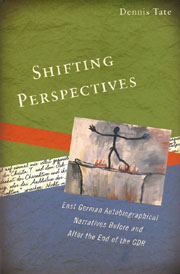Book contents
- Frontmatter
- Contents
- Acknowledgments
- List of Abbreviations
- Introduction: East German Autobiographical Narratives: Challenging Conventional Genre Distinctions
- Part 1 Historical Overview
- Part 2 Case Studies in Autobiographical Writing
- 2 Brigitte Reimann: The Constraints of First-Person Fiction
- 3 Franz Fühmann: The Deconstruction of an “Exemplary” Biography
- 4 Stefan Heym: Strategies of Self-Concealment in Fictional and Autobiographical Mode
- 5 Günter de Bruyn: From the ”Lies” of Fiction to the “Truth” of Autobiography?
- 6 Christa Wolf: “Subjective Authenticity” in Practice: An Evolving Autobiographical Project
- Bibliography
- Index
4 - Stefan Heym: Strategies of Self-Concealment in Fictional and Autobiographical Mode
from Part 2 - Case Studies in Autobiographical Writing
Published online by Cambridge University Press: 05 February 2013
- Frontmatter
- Contents
- Acknowledgments
- List of Abbreviations
- Introduction: East German Autobiographical Narratives: Challenging Conventional Genre Distinctions
- Part 1 Historical Overview
- Part 2 Case Studies in Autobiographical Writing
- 2 Brigitte Reimann: The Constraints of First-Person Fiction
- 3 Franz Fühmann: The Deconstruction of an “Exemplary” Biography
- 4 Stefan Heym: Strategies of Self-Concealment in Fictional and Autobiographical Mode
- 5 Günter de Bruyn: From the ”Lies” of Fiction to the “Truth” of Autobiography?
- 6 Christa Wolf: “Subjective Authenticity” in Practice: An Evolving Autobiographical Project
- Bibliography
- Index
Summary
Internal Ambivalence, External Respect: Contradictions in Critical Reception
STEFAN HEYM PROVIDES our first case study of an author who appeared to have little time for autobiography before the watershed of 1979, when he was the most prominent of the authors expelled from the GDR Writers' Union following the infamous tribunal in East Berlin's Rotes Rathaus. He then spent most of the 1980s working on the longest of the works discussed in this volume, Nachruf (1988). Along with his near-contemporary Stephan Hermlin, who was also Jewish, born in the Saxon industrial town of Chemnitz, and among the youngest of the literary exiles from Hitler's Germany, Heym is often viewed as a father-figure to the generation of pioneering GDR authors to which Fühmann, Wolf, and Reimann belong. Criteria such as post-1945 literary breakthrough are taken as the means of separating them from the previous generation of already established literary exiles, such as Brecht, Seghers, and Becher, who chose to return to the Soviet Zone after the war. Like all categorizations of this kind, it is less than watertight, in the sense that Heym had already enjoyed considerable popular success in the United States during the war years, with his best-selling first novel, Hostages (1942), rapidly turned into a feature film by one of the biggest American production companies, Paramount, under the direction of Frank Tuttle (1943). When he returned to Europe in 1952 and became a citizen of the GDR, it was as one of the last émigrés to do so.
- Type
- Chapter
- Information
- Shifting PerspectivesEast German Autobiographical Narratives before and after the End of the GDR, pp. 128 - 158Publisher: Boydell & BrewerPrint publication year: 2007



